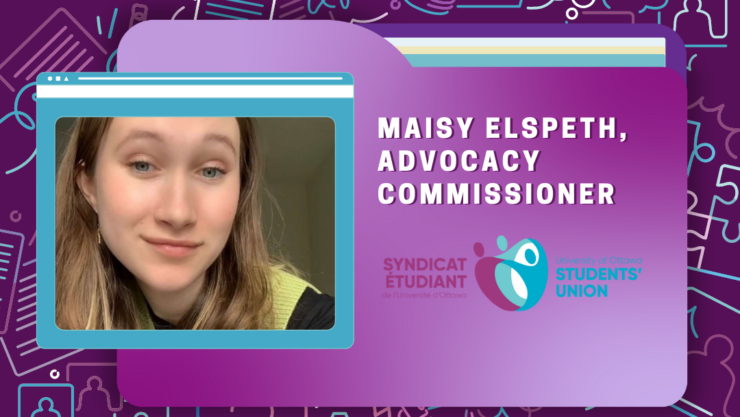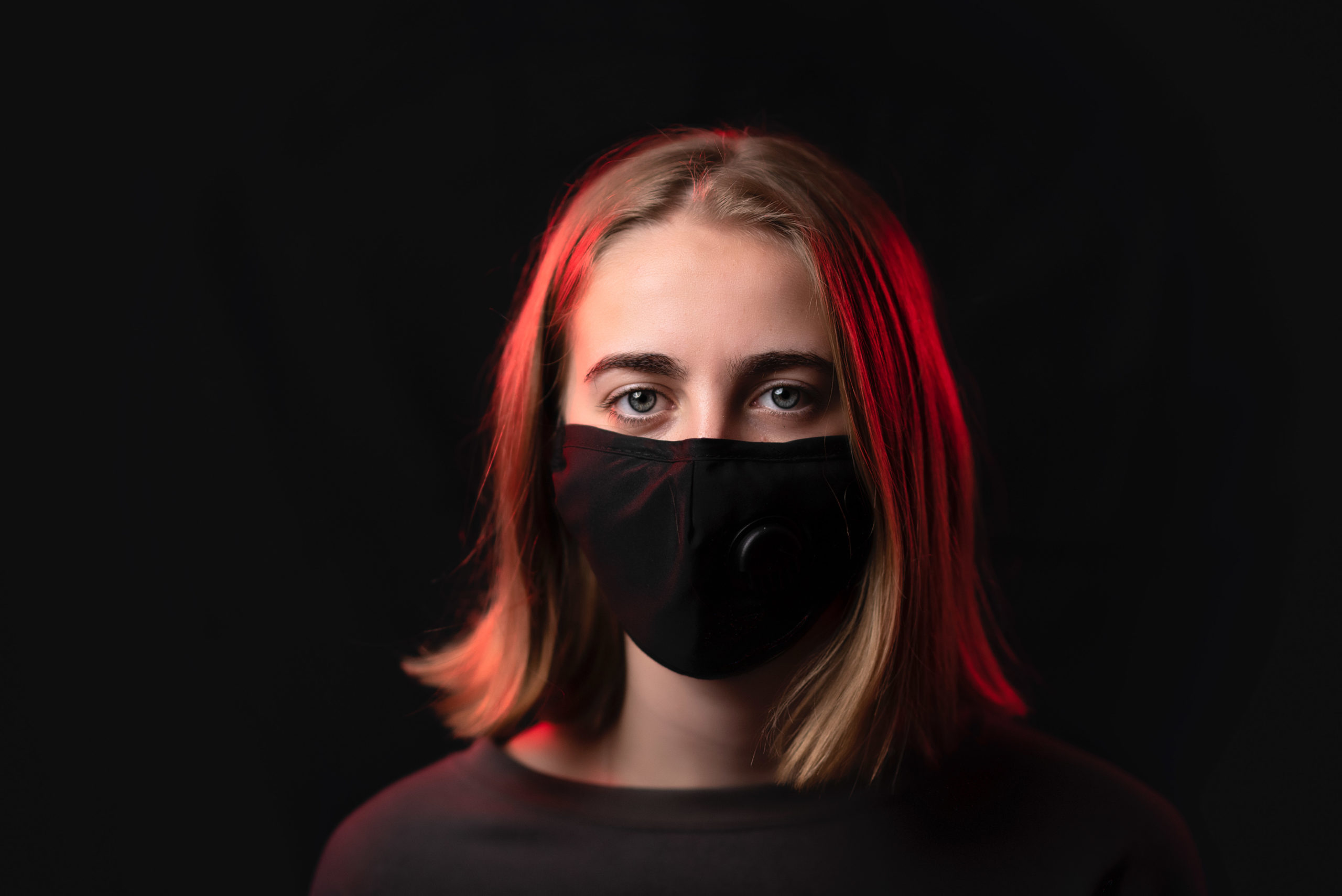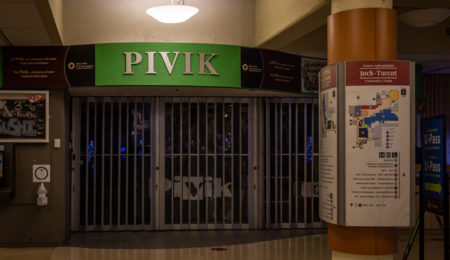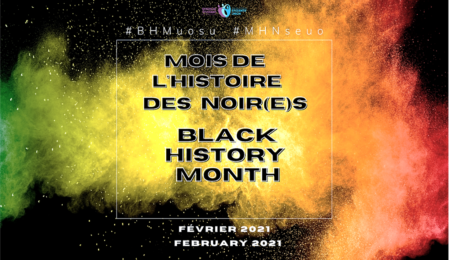“No campaign will be effective if we don’t have student engagement […] we need to increase student engagement in the union and union affairs.”
On June 1, The Fulcrum spoke with Advocacy commissioner for the University of Ottawa Students’ Union (UOSU), Maisy Elspeth. What follows is a transcript of that conversation, lightly edited for readability.
The Fulcrum (F): Can you introduce yourself for us?
Maisy Elspeth (ME): My name is Maisie Elspeth. I was running and now am elected advocacy Commissioner for UOSU. I use she/her pronouns, and I am in biomedical science with a minor in philosophy. I’m going into my third-year, although my years will look a little different as you know, being part-time and all that so, third-year-ish.
F: Let’s talk about your experience with student life on campus or relevant experience to help you in this role?
ME: I was a volunteer for a UOSU service — foot patrol in my first year — I got involved kind of things almost by osmosis, by proxy. I was the deputy commissioner for university and equity affairs with UOSU since about November of last year. So I was essentially [working under] the advocacy commissioner; it would have been the equity commissioner, but obviously, we didn’t have one.
Through that, I was adjacent to [my current] role; I was constantly seeing what [the job] took to a degree and also the different projects, and campaigns that were currently happening.
F: And in your own words, can you tell me the mandate for the UOSU advocacy Commissioner?
ME: The advocacy commissioner is in charge of all the lobby work of the UOSU. This can be to the municipal, provincial, the federal government, and as well as assist the president in — currently, it’s just me but it’s theoretically and hopefully soon — supports the president and University-centered campaigns, such as fighting tuition, working on different initiatives on campus related to racism. It could be anything that really involves students, and then also helps on the more political side of the equity campaigns of the Equity commissioner.
So a lot of crossover and it’s a lot of team assistance.
F: Great. Are there any issues that you believe UOSU should be spending more resources tackling than they have in past terms?
ME: Yes. UOSU visibility on campus and election turnout.
I was unfortunately uncontested as was the operations commissioner and we only had two candidates for another role. And I think that is tragic, truly. I want to see more student engagement. I want to see those numbers go up in the voting, but also people will only show up to vote if there are candidates. It’s a cycle, right?
And then at the same time, people don’t know about our happenings and won’t want to run, so really I’m looking forward to hopefully having a UOSU visibility campaign during 101-Week because that is the time when a lot of first-years are around.
F: Great. And with all those options in mind, how do you intend to facilitate communication between students, the BOD, and the executive?
ME: This has been a central focus of discussion for the last few years. There was an ad hoc committee on communication and engagement formed in the 2020-21 mandate when things were all virtual. And that changed and became a permanent committee, and I’m actually chairing that committee. So fantastic that you’re asking me.
I think a big part is really exploring the options that we have now that we’re not all virtual. Communication, like social media and emails, are great but they can only go so far.
You want UOSU to be, I don’t want to be like a household name, but like a Res-dorm name or like any college house name. People should have the knowledge and that’s fully on UOSU to make that happen, and it won’t happen in just one mandate. It’ll be a continuous project, but I hope to really get that kick-started this year with the in-person engagement stuff.
F: Great. And what committees are you chairing or part of and why did you want to be part of those committees in particular?
ME: Yeah. So I am chairing the advocacy committee and that’s automatic; it’s in the [UOSU] Constitution.
Another committee I’m on is the Equity Committee, although I’m not the chair on that one — that’s Joyce [Williams], who’s our equity Commissioner.
I’m also on [communications] and engagement and I’m really excited about that. I am running it pretty informally. I really want it to be a brainstorming and collaborative space for board members to shoot out ideas and let’s see what sticks. This is the time for some degree of experimenting; like we kind of can’t get much worse in terms of our elections engagement, and I might eat my words there, but I don’t really think so. And therefore, I think this is the time to really go as hard as we can.
But yeah, those are the two main ones. And then there are other committees or things with the University and other things I’m a part of: roundtables and such, but the only two that I chair for the board are advocacy and communications.
F: Okay, thank you. I probably should have asked this one sooner. But why did you choose to run for Advocacy Commissioner?
ME: Oh, that’s a great question. I chose to run truly because I am passionate about the mandate. And because I see, again, as I’ve talked about the problems with engagement and what we’ve seen in the past few in the past year, I see it as an opportunity. I really see it as [having] unlimited potential.
And of course, there are limits to my mandate, but overall with the Union, there’s huge potential and I really wanted to do my best, particularly with the foundational things. [That’s] because advocacy is in charge of campaigns, but no campaign will be effective if we don’t have student engagement in that campaign. And therefore, we need to increase student engagement in the union and union affairs.
So I can have all these lofty goals related to specific campaigns, but I don’t think they’re realistic this year until we have that solid foundation of engagement, solid operational abilities, and all of that type of thing.
So that’s kind of why it’s more on the foundational stuff right now just because no other future person in my position, I want them to have that all set up for them and have it all like super engaged, have people to be able to reach out to in the right way to succeed in the advocacy mandate.
(F): Do you believe that the election turnout and results give you a strong mandate from students?
ME: No, not at all. And that’s really honest, right? The reason I think I have a strong mandate is because of my personal conviction and dedication to this role. And [it] is lucky that I was a candidate interested, but if not, yeah, I don’t feel a strong mandate from the students. I feel a strong mandate from the board.
The board is super engaged this year. I mean, as you saw, as you showed up, there’s lots of engagement. And that’s fantastic. Yeah, I feel like it’s really…it’s some motions from [General Assembly] GA board and collaborative projects that I’m working on. But I don’t feel like that necessarily comes from students because there’s no way 3 per cent of students [are] voting. You know, it’s not students putting their trust in me.
I’m grateful I’m in this position. But that’s for me to grow from and try to push…try to lift off from and not from students directly, unfortunately, I wish it was. I truly wish I was contested, and I truly wish you know, I felt I had more trust of students in me, but that’s not the case.
F: Can you give me a rundown of your portfolio as Advocacy commissioner and when students should reach out to you versus say the Equity commissioner?
ME: Because there was no Equity commissioner in the past a lot of the Advocacy absorbed some of those roles. So part of what Joyce and I are collaboratively navigating is kind of divvying up who is responsible for what, and a lot of it does also go with what we’re personally passionate about.
I’m not an international student [but] Joyce is, so she’ll have a lot more connections related to those types of issues. So there is crossover and that’s true with like a lot of the commissioner positions.
In terms of campaigns, definitely like the lobby, the more and more political work and where there is a bit of muddy waters […] is related to university advocacy. We have the president who’s in charge of the bigger campaigns theoretically. But obviously, a lot of the time that involves equity concerns and things like that.
So for the most part, it’s a collaborative effort. We are an executive team. When we have our projects and such I reach out whenever I need help. ‘Hey, I’m really busy with something this week’, [and we discuss] how we can support each other in these roles.
F: What were some of your top concerns coming into the role?
ME: Again, students’ faith in the executive [and] students’ faith in the board.
Again, election turnout, shows that [student engagement] doesn’t really exist. And I don’t necessarily think because people don’t have faith, people don’t know necessarily. Or there’s no contestation and therefore, why does anyone care to vote? And that takes me another 10 minutes out of my day; not really probably takes about six to log in and do all that. But why would I do it if they’re going to probably get it anyway?
There’s no way for the union to thrive in the way that we want it to. It has to have that engagement. And then we have to have a GA that puts its trust in the board that it elects and the executive elects.
And I’m super confident about our executive team this year. I’ve obviously gotten to know them quite well over the first month of our mandate and everyone has their goals and their passions, but that’s to a degree out of luck, unfortunately. And I have no problems being honest about that. I’m not gonna sugarcoat it.
F: I appreciate that. What should students be paying attention to from UOSU over the summer?
ME: To a degree, 101 Week is a big focus of summer planning, and that relates to registered student governments (RSGs) as well. So connected to your RSGs, there are guide applications opening [and] UOSU is kind of the facilitator of 101 Week, as much as RSGs do their amazing work. But yeah, getting involved in 101 Week is a great way to kind of start touching base.
UOSU will be working on everything surrounding 101-Week, which involves a services Fair, which relates to our services. There are [hopefully] going to be workshops around student rights that I’m hoping to set up soon. And lots of other opportunities to get involved and see how the union is structured; what we offer and what we do for students. Our [summer board meetings are discussing things like the] healthcare plan and U-pass stuff, for example.
But for right now, obviously, tuition is the big, new focus at least for [June 1] as we have the budget released. And so currently, I’m personally working on different campaigns and specific initiatives surrounding collaboration with other unions.
[I] have the regular meeting that we meet with all the other unions on campus, and we have our meeting with the administration that will eventually come up as well.
But a lot of the summer for UOSU is establishing itself in preparation for the fall. So we’re creating our budget, which you’ll probably talk to the Operations commissioner about, and all of that is happening right now to set us up, hopefully for a successful semester, two semesters, and the mandate as a whole.
F: I want to ask you about the vacancies that were part of UOSU before the interim directors and commissioners came in. Can you talk about the role of interim directors or executive committee members to the overall governance of UOSU?
ME: Yeah. So in terms of voting power, the exact same as any other elected position. So an interim executive, for example, both in the executive committee and both as a director on the board, we are directors as much as you know, we’re executives on top of that. But at the kind of the main point of our governance is that we’re directors and we have a single vote on the board.
But the biggest thing is that [the mandate is] a shorter time, right? So you’re cut off essentially October/November when those positions are opened up for actual election again, and what this means is you have a timeline that is a lot shorter.
So for someone in those positions, you have to have your projects and see how are you going to fit them in. How can I get assistance from people who are going to be here longer to continue these projects? Seeing what you can do with the time given to you, of course. It’s really unfortunate because I’m given so much more time than interim executives and directors.
But overall, I would say [interim] directors, there’s a bit less of an impact. Just because I think that their portfolio is so based on longer-term projects and really bigger initiatives that they’re taking on.
F: So that was my last prepared question, but I want to make sure that you have a chance to say anything that I might have missed before we close out.
ME: Yeah. I am truly really excited for this year. As much as it’s going to be a bit of a challenge to navigate. There are a few different things we have to navigate this year around our agreement with the University that is renegotiated this year. There’s a whole bunch of things that come up. And there’s a lot to do essentially.
And so with the interim status, I’m really confident in the folks that we hired and hopefully, we’ll be hiring a president and a great clubs and service Commissioner soon as well.
I’m really confident and I’m really hopeful for this year, and as much as I have projects that I can zoom in on and I do feel very solid in the team, the executive team that we have, and I’m super happy to have an engaged board. They’re so engaged. Showing up to the committees that they are not necessarily a part of, doing all these different things for the purpose of caring about this organization.
And so I would encourage students to reach out to their faculty representatives, even just to talk and get to know them, you know, they’re students just as much as I am as well. You know, reach out to me, I’m very happy to receive emails. I’m really happy to set up meetings. I have office hours as well. All the execs do, anyone can come into the office during those times they’ll be posted on the website.
We’re here to serve students and to listen to concerns and while of course, we have our projects in our portfolios, we answer to students.








